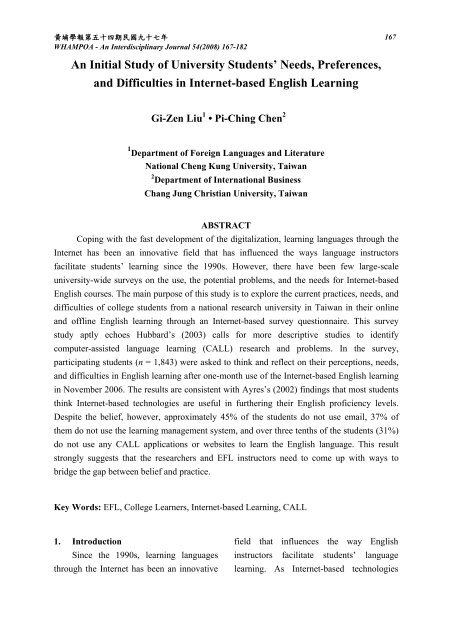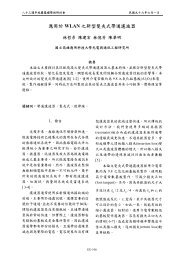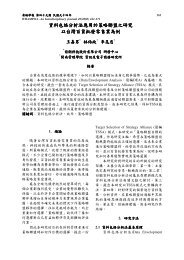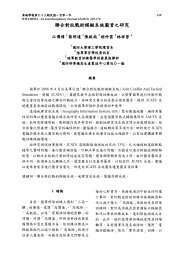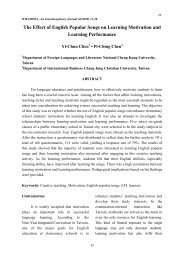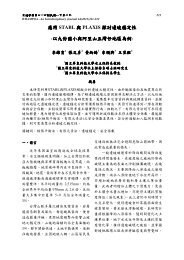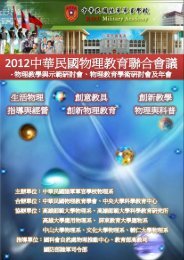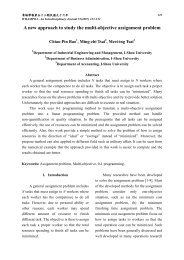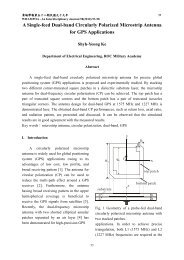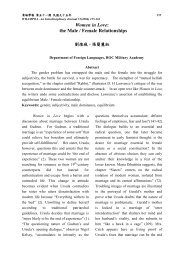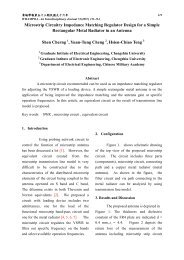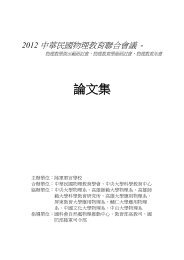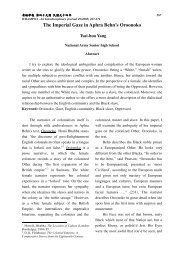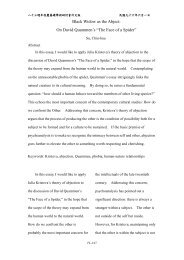An Initial Study of University Students' Needs, Preferences, and ...
An Initial Study of University Students' Needs, Preferences, and ...
An Initial Study of University Students' Needs, Preferences, and ...
- No tags were found...
Create successful ePaper yourself
Turn your PDF publications into a flip-book with our unique Google optimized e-Paper software.
黃 埔 學 報 第 五 十 四 期 民 國 九 十 七 年 167WHAMPOA - <strong>An</strong> Interdisciplinary Journal 54(2008) 167-182<strong>An</strong> <strong>Initial</strong> <strong>Study</strong> <strong>of</strong> <strong>University</strong> Students’ <strong>Needs</strong>, <strong>Preferences</strong>,<strong>and</strong> Difficulties in Internet-based English LearningGi-Zen Liu 1 • Pi-Ching Chen 21 Department <strong>of</strong> Foreign Languages <strong>and</strong> LiteratureNational Cheng Kung <strong>University</strong>, Taiwan2 Department <strong>of</strong> International BusinessChang Jung Christian <strong>University</strong>, TaiwanABSTRACTCoping with the fast development <strong>of</strong> the digitalization, learning languages through theInternet has been an innovative field that has influenced the ways language instructorsfacilitate students’ learning since the 1990s. However, there have been few large-scaleuniversity-wide surveys on the use, the potential problems, <strong>and</strong> the needs for Internet-basedEnglish courses. The main purpose <strong>of</strong> this study is to explore the current practices, needs, <strong>and</strong>difficulties <strong>of</strong> college students from a national research university in Taiwan in their online<strong>and</strong> <strong>of</strong>fline English learning through an Internet-based survey questionnaire. This surveystudy aptly echoes Hubbard’s (2003) calls for more descriptive studies to identifycomputer-assisted language learning (CALL) research <strong>and</strong> problems. In the survey,participating students (n = 1,843) were asked to think <strong>and</strong> reflect on their perceptions, needs,<strong>and</strong> difficulties in English learning after one-month use <strong>of</strong> the Internet-based English learningin November 2006. The results are consistent with Ayres’s (2002) findings that most studentsthink Internet-based technologies are useful in furthering their English pr<strong>of</strong>iciency levels.Despite the belief, however, approximately 45% <strong>of</strong> the students do not use email, 37% <strong>of</strong>them do not use the learning management system, <strong>and</strong> over three tenths <strong>of</strong> the students (31%)do not use any CALL applications or websites to learn the English language. This resultstrongly suggests that the researchers <strong>and</strong> EFL instructors need to come up with ways tobridge the gap between belief <strong>and</strong> practice.Key Words: EFL, College Learners, Internet-based Learning, CALL1. IntroductionSince the 1990s, learning languagesthrough the Internet has been an innovativefield that influences the way Englishinstructors facilitate students’ languagelearning. As Internet-based technologies
168 黃 埔 學 報 第 五 十 四 期 民 國 九 十 七 年have been emerging <strong>and</strong> their applicationshave been providing numerous learningopportunities for teachers <strong>and</strong> instructionaldesigners to engage students ininteraction-enhanced, collaboration-supportedtwo-way written <strong>and</strong> oral communications topractice the target language (Egbert, 2005;Levy & Stockwell, 2006). Rushby (2005)observes that a new constructivist learningparadigm <strong>of</strong> various uses <strong>of</strong> Internet-basedtechnologies <strong>and</strong> environments iscontinuously emerging. However, how tomake good use <strong>of</strong> the Internet-basedtechnologies <strong>and</strong> integrate them into thelanguage curriculum has become asignificant issue (Liu, 2005). Therefore, thisstudy was intended to find out thestakeholders’ (students) perceptions, needs,<strong>and</strong> problems when doing so.Since 2006, the researchers have beenfollowing what Rushby proposes to design<strong>and</strong> implement multi-year, university-wideInternet-based English learning technologies<strong>and</strong> environments for all the students atNational Cheng Kung <strong>University</strong> (NCKU).As Huang (2006) argues that there are notsignificant differences between the print <strong>and</strong>Web-based survey, in order to better servethe students <strong>and</strong> meet their needs, auniversity-wide Web-based survey on theuse <strong>of</strong> <strong>and</strong> need for Internet-based Englishlearning was conducted.This study was intended to investigatethe following issues by using thequantitative research methodology: (a) thecurrent practices <strong>and</strong> needs <strong>of</strong> Englishlearning through various Internet-basedtechnologies <strong>and</strong> applications from theperspectives <strong>of</strong> graduate <strong>and</strong> undergraduatestudents at NCKU, <strong>and</strong> (b) the problems <strong>and</strong>their possible solutions when learningEnglish online <strong>and</strong> <strong>of</strong>fline for skilldevelopment <strong>and</strong> communication purposes.In the survey, both graduate <strong>and</strong>undergraduate students were requested tothink <strong>and</strong> reflect their perceptions, needs <strong>and</strong>difficulties when learning English online<strong>and</strong> <strong>of</strong>fline after the Internet-based Englishlearning technologies have been used forone month. The purpose <strong>of</strong> the survey wasto identify the perceptions <strong>of</strong> students on theuse <strong>of</strong> the learning technologies to see if anyeffort should be made to improve thesituation. Diverse perspectives from students<strong>of</strong> various academic majors <strong>and</strong>backgrounds were analyzed <strong>and</strong> discussed.The results <strong>of</strong> data analyses echo Ayres’s(2002) study that the majority <strong>of</strong> studentsthink Internet-based technologies are usefulfor them to further develop their targetlanguage as well as meet their needs in thecourse <strong>of</strong> study. Hence, English instructorsneed to positively respond to their needs <strong>and</strong>design suitable English learning activities tobring about desired learning outcomes.2. The NCKU Internet-based EnglishLearning <strong>and</strong> Testing ProjectNational Cheng Kung <strong>University</strong>(NCKU) is a comprehensive, nationalresearch university in southern Taiwan.There are nine colleges with 45 graduateinstitutes or departments, including over10,000 undergraduate students <strong>and</strong> over8,500 graduate students. Currently theInternet has been available through thebroadb<strong>and</strong> cable <strong>and</strong> the wireless way.Concerning the learning management
Gi-Zen Liu, Pi-Ching Chen:<strong>An</strong> <strong>Initial</strong> <strong>Study</strong> <strong>of</strong> <strong>University</strong> Students’ <strong>Needs</strong>, <strong>Preferences</strong>, <strong>and</strong> 169Difficulties in Internet-based English Learningsystem, iteach (http://iteach.ncku.edu.tw)was developed <strong>and</strong> set up since 2000, but itcan only provide the Chinese version. SinceJanuary 2006, The NCKU Internet-basedEnglish Learning <strong>and</strong> Testing Project(http://english.ncku.edu.tw/content/) isintended to help all the students developtheir English <strong>and</strong> ICT (information <strong>and</strong>communication technology) abilities inorder to compete with other students in theglobal village.Until now, a bilingual (English-Chinese)learning management system, anInternet-based English testing system, <strong>and</strong>multiple-use <strong>of</strong> CALL applications havebeen constructed. In addition, eighteenculture-based <strong>and</strong> EAP-focused onlineinteractive lessons have been developed forstudents to use since August 2007. In thefollowing years, dozens <strong>of</strong> online ESP <strong>and</strong>EAP lessons based on the various needs <strong>of</strong>the nine different colleges at NCKU willalso be developed. Therefore, the continuoususe <strong>of</strong> the Internet-based survey is needed indifferent stages to identify instructors’ <strong>and</strong>students’ perceptions <strong>and</strong> needs as themulti-year project has been providingstate-<strong>of</strong>-the-art, cutting-edge technologies tomeet their needs for the learning goals <strong>and</strong>effects.3. The Survey: Research ProceduresThe research question that guided thisstudy was “What are the current practices,needs, <strong>and</strong> problems when NCKU studentslearn English online <strong>and</strong> <strong>of</strong>fline?” InOctober 2006, the survey (see Appendix A)was established on the Internet after theitems were developed. According to Nunan(1992), surveys are the most widely applieddescriptive method in educational/teachingresearch to collect “a snapshot <strong>of</strong> conditions,attitudes, <strong>and</strong>/or events at a single point intime” (p. 140). This survey study matchesHubbard’s (2003) calls for more descriptivestudies to identify CALL research <strong>and</strong>related problems.Due to the frequent use <strong>of</strong> thecomputer by NCKU students, <strong>and</strong> there areno significant differences between the print<strong>and</strong> Web-based survey (Huang, 2006), itwas determined that the online survey wasappropriate for the learners as well as users.It was estimated that each student neededfifteen to twenty minutes to complete thesurvey. Participants were informed that thedata they provided would be used forimproving the current situation only <strong>and</strong>their personal files would not be revealed.The calling for participants in thesurvey was spread through the universityonline bulletin boards, the onlineforums/BBS at various departments, <strong>and</strong>emails to recruit as many students aspossible. During the nine days <strong>of</strong>investigation time until November 8, 2006, atotal <strong>of</strong> 1,843 graduate <strong>and</strong> undergraduatestudents (about 10% <strong>of</strong> all NCKU students)completed their survey questionnaires. Thepercentage <strong>of</strong> participants met theresearcher’s expectation.4. Data <strong>An</strong>alysisIn this section, four parts <strong>of</strong> thecollected data were analyzed <strong>and</strong> describedseparately based on their contents, including(a) statistical differences between groups <strong>of</strong>students, (b) current practices <strong>of</strong> English
170 黃 埔 學 報 第 五 十 四 期 民 國 九 十 七 年learning, (c) students’ preferences <strong>and</strong> needs<strong>of</strong> Internet-based English learning, <strong>and</strong> (d)students’ difficulties in learning Englishonline <strong>and</strong> <strong>of</strong>fline. Each part is as follows.4.1 Statistical Differences betweenGroups <strong>of</strong> StudentsThe researchers <strong>of</strong> this study followedwhat Ayres (2002) suggested that theresearcher should first identify “if there wereany statistical differences between thevarious groups represented in the sample” (p.245). Among the participants, there were1,157 males (63%) <strong>and</strong> 686 females (37%).The male-female ratio in the study is veryclose to that (65% : 35%) at NCKU.Additionally, 925 graduate students (50%)<strong>and</strong> 918 undergraduate students (50%)presented their answers to the surveyquestionnaires.It seems that graduate students aremore concerned about their English learningvia the Internet than undergraduate studentssince the number <strong>of</strong> graduate students is1,500 less than that <strong>of</strong> undergraduatestudents at NCKU. This condition mayreveal the fact that starting from 2006-2007academic year, most NCKU graduateinstitutes require their students to completetheir theses or dissertations in English aswell as to publish research papers ininternational journals before graduation. Asto the preference <strong>of</strong> Internet technologies <strong>of</strong>students from different departments, it issafe to say that there is no significantdifference among students <strong>of</strong> differentmajors based on the data.4.2 Students’ Current Practices <strong>of</strong>English LearningIn order to underst<strong>and</strong> NCKUstudents’ perceptions <strong>of</strong> English learning,five subtopics included the most <strong>and</strong> theleast satisfactory language skills <strong>and</strong>language areas, English tests <strong>and</strong> thegraduation policy, the practice <strong>of</strong> computer<strong>and</strong> the Internet use, students’ self-learningtime <strong>and</strong> materials, <strong>and</strong> Internet-basedEnglish learning activities <strong>and</strong> conditions.4.2.1 The Most Satisfactory <strong>and</strong> the LeastSatisfactory Language Skills <strong>and</strong>Language AreasThe average English learningexperience is about ten years for theparticipating students. When asked aboutwhat language skills (listening, speaking,reading, <strong>and</strong> writing) <strong>of</strong> English that they aremost <strong>and</strong> least satisfied with, 81% <strong>of</strong> theparticipating students think they areconfident in reading ability, <strong>and</strong> more than63% <strong>of</strong> the students are least satisfied withtheir speaking abilities.As to the language areas (vocabulary,culture, <strong>and</strong> grammar), 28% <strong>of</strong> the studentsthink their syntactical knowledge issatisfactory, 24% <strong>of</strong> the students aresatisfied with their vocabulary level, <strong>and</strong>only less than 13% <strong>of</strong> the students feel goodabout the culture knowledge <strong>of</strong> the targetlanguage. Less than 1% <strong>of</strong> the students (n =6) are satisfied with all language skills <strong>and</strong>language areas. However, 11% <strong>of</strong> thestudents (n = 206) are dissatisfied with anylanguage skills or language areas.
Gi-Zen Liu, Pi-Ching Chen:<strong>An</strong> <strong>Initial</strong> <strong>Study</strong> <strong>of</strong> <strong>University</strong> Students’ <strong>Needs</strong>, <strong>Preferences</strong>, <strong>and</strong> 171Difficulties in Internet-based English Learning4.2.2 English Tests <strong>and</strong> the GraduationPolicyIn order to compete with internationalstudents globally, since 2004-2005 academicyear NCKU required all students to pass theintermediate level <strong>of</strong> one <strong>of</strong> the st<strong>and</strong>ardizedtests before graduation, including GeneralEnglish Pr<strong>of</strong>iciency Test (GEPT), Test <strong>of</strong>English for International Communication(TOEIC), International English LanguageTesting System (IELTS), or Test <strong>of</strong> Englishas a Foreign Language (TOEFL). In thesurvey, only 35% <strong>of</strong> the students took one <strong>of</strong>the four st<strong>and</strong>ardized tests, <strong>and</strong> 87% <strong>of</strong> thempassed the test. Nearly 65% <strong>of</strong> the studentsthink the graduation policy is reasonable <strong>and</strong>acceptable to help them improve theirEnglish before graduation.4.2.3 The Practice <strong>of</strong> Computer <strong>and</strong> theInternet UseApproximately 91% <strong>of</strong> the students (n =1,684) have their own personal computers ornotebook computers, <strong>and</strong> 96% <strong>of</strong> thestudents use the broadb<strong>and</strong> cable to connectto the Internet. As for the concern <strong>of</strong>learning facilities, 86% <strong>of</strong> the students thinkthey can easily have a computer for personaluse in the lab or anywhere on campus.Nearly half <strong>of</strong> the students (49%) feel thewireless Internet is available anytime,anywhere on campus.4.2.4 Self-learning Time <strong>and</strong> MaterialsCurrently, NCKU freshmen have tospend three hours in the formal English class,<strong>and</strong> other students have two <strong>and</strong> a half hours<strong>of</strong> English lessons. According to the surveydata analysis, over 70% <strong>of</strong> the students usethe university’s magazines <strong>and</strong> books tolearn English, <strong>and</strong> the average use time isabout one hour <strong>and</strong> a half per week.4.2.5 Internet-based English LearningActivities <strong>and</strong> ConditionsThe average time <strong>of</strong> Internet-basedEnglish learning for all participatingstudents is 1.3 hours per week. Over half <strong>of</strong>the students (55%) use the email to learntheir English, 63% <strong>of</strong> the students use thelearning management system to learnEnglish, <strong>and</strong> nearly seven tenths <strong>of</strong> thestudents (69%) use CALL applications orWebsites to develop their English. The mostused CALL application is Dr. Eye (an onlinedictionary).When asked about on which languageskill or area the email can help one learnEnglish most, 38% <strong>of</strong> the students thinkreading skill <strong>and</strong> 29% <strong>of</strong> the students thinkwriting skill. When asked about on whichlanguage skill or area the learningmanagement system can help one learnEnglish most, 48% <strong>of</strong> the students thinklistening skill <strong>and</strong> 28% <strong>of</strong> them thinkreading skill. More than half <strong>of</strong> the students(51%) think CALL is most useful whendeveloping the listening ability.4.3 Students’ <strong>Preferences</strong> <strong>and</strong> <strong>Needs</strong> <strong>of</strong>Internet-based English LearningAbout four fifths <strong>of</strong> the students (78%)think the hybrid English course (blendedEnglish learning) is better than the totalclassroom-based (17%) <strong>and</strong> the fully onlinecourse (5%). Online reading (63%), onlinelistening (54%), <strong>and</strong> online language games
172 黃 埔 學 報 第 五 十 四 期 民 國 九 十 七 年(44%) are the most preferred Internet-basedEnglish learning activities.Based on the results <strong>of</strong> the survey,speaking development (58%), listeningdevelopment (54%), <strong>and</strong> language games(44%) are regarded as the most preferredclassroom-based English learning activities.More than three fifths <strong>of</strong> the students (63%)think learning English through the Internet isnecessary, <strong>and</strong> 70% <strong>of</strong> them think learningEnglish through the Internet is the trend.The average time that NCKU studentswould like to spend in online Englishlearning is 2.8 hours per week. Nearly onetenth <strong>of</strong> the students (11%) prefer onlineinteractive English learning video lessons,10% <strong>of</strong> the students prefer oral CALLprograms, but about 10% <strong>of</strong> the students donot know which CALL would be mosthelpful to them.4.4 Students’ Problems <strong>of</strong> LearningEnglish Online <strong>and</strong> OfflineA fairly high percentage <strong>of</strong> thestudents (97%) underst<strong>and</strong> the importance <strong>of</strong><strong>and</strong> prefer using English frequently in orderto improve English; however, 50% <strong>of</strong> themuse Chinese most in English class. Lessthan seven tenths <strong>of</strong> the students (67%)would like to watch English programs onTV if there are other programs <strong>of</strong> otherlanguages existing, while others (33%) willnot. Approximately 63% <strong>of</strong> the studentswill join English clubs on campus topractice speaking English if there are goodones, while 37% <strong>of</strong> the students will neverdo so.On the contrary, more than 17% <strong>of</strong> thestudents think their English courses aremeaningless, 14% <strong>of</strong> the students feel theirEnglish courses are awful, <strong>and</strong> 14% thinktheir English course are simple. Nearlyhalf <strong>of</strong> the students (45%) do not use theemail to learn their English, 37% <strong>of</strong> thestudents do not use the learning managementsystem to learn English, <strong>and</strong> 31% <strong>of</strong> thestudents do not use any CALL applicationsor websites to develop their English.5. Discussion <strong>and</strong> ConclusionThe findings <strong>of</strong> the survey study aresurprisingly different from those originallyexpected by the researchers. Although 91%<strong>of</strong> the students (n = 1,684) have their ownpersonal computers or notebook computers,some <strong>of</strong> them do not use the email (45%),the learning management system (37%), <strong>and</strong>online CALL applications (31%) to developtheir English for written or oralcommunication. It seems that most NCKUstudents rely on traditional ways in learningEnglish, or do not know how to takeadvantage <strong>of</strong> the Internet-based technologiesto develop language skills <strong>and</strong> enhancelanguage areas. Luckily the majority <strong>of</strong>students are willing to spend more time (2.8hours per week) than they really do (1.3hours per week). This fact encourages theresearchers, <strong>and</strong> perhaps many Englishinstructors that if university students areguided properly, they will be more willing toengage themselves in the Internet–basedEnglish learning activities.In the present study, plagiarism-relatedexperiences were not used in the surveyquestionnaire. Nowadays a number <strong>of</strong> newsreports indicate that students have beenusing search engines (e.g., google.com,
Gi-Zen Liu, Pi-Ching Chen:<strong>An</strong> <strong>Initial</strong> <strong>Study</strong> <strong>of</strong> <strong>University</strong> Students’ <strong>Needs</strong>, <strong>Preferences</strong>, <strong>and</strong> 173Difficulties in Internet-based English Learningyahoo.com) to look for relevant informationto complete their assignments <strong>and</strong> papers.Some <strong>of</strong> them even do just copy-<strong>and</strong>-pasteto plagiarize other’s works <strong>and</strong> infringe onthe copyright. Intellectual property shouldbe a major concern <strong>of</strong> all English teachers<strong>and</strong> students should be taught to respect it<strong>and</strong> avoid misusing other’s works. It isstrongly suggested that future research <strong>of</strong>this kind should involve anti-plagiarismissues. Liu <strong>and</strong> Chen (2007) suggest thethree types <strong>of</strong> integrating IBT into languagecurricula based on the Taxonomy as shownin Table 1.Table 1.The Three Types <strong>of</strong> Integrating IBT into Language Curricula Based on the TaxonomyCategory Locus <strong>of</strong> Control Instruction ModeIntegrating the CMC tool(Chat, Conferencing,MSN Messenger, Skype,Forum, Email, etc.)Mostly peer-supported;tools onlyDrill-<strong>and</strong>-practice;one-to-one <strong>and</strong> one-togroup, collaborationIntegrating the LMS(Open-source learningplatforms, Blackboard.com,WebCT.com, etc.)Teacher-led,peer-supported, <strong>and</strong>self-controlled;tool-enhanced contentLecturing; one-to-one<strong>and</strong> one-to-group,collaboration;Drill-<strong>and</strong>-practiceIntegrating the CALLprogramsMostly self-controlled;tool-enhanced contentTutorials, testing,simulations, games, etc.(BBC Learning English,language learning Websites)Note. CMC st<strong>and</strong>s for computer-mediated communication; LMS st<strong>and</strong>s for language management systems;CALL st<strong>and</strong>s for computer-assisted language learning.In sum, as Price <strong>and</strong> Gascoigne (2006)highlight, a clear <strong>and</strong> deep underst<strong>and</strong>ing <strong>of</strong>NCKU students’ perceptions, needs, <strong>and</strong>problems will inform <strong>and</strong> improve thecurrent instructional processes as well aslearning activities through a well-blendedleaning environment as Bonk <strong>and</strong> Graham(2006) propose. In addition, Liu & Chen(2007) develop a taxonomy for integratingInternet-based technologies into languagecurricula (see Table 1), <strong>and</strong> it provides apractical solution that we will work with to<strong>of</strong>fer computer-mediated communication(CMC) tools, learning management systems,<strong>and</strong> CALL programs to universities studentsto help them develop their Englishdynamically. The researchers as well as theproject director will positively respond tostudents’ needs <strong>and</strong> problems to provideappropriate training <strong>and</strong> workshops toEnglish teachers <strong>and</strong> students on the correctuse <strong>of</strong> the Internet-based English learning
174 黃 埔 學 報 第 五 十 四 期 民 國 九 十 七 年technologies <strong>and</strong> on integrating them intoEnglish curricula.Acknowledgements<strong>An</strong> earlier version <strong>of</strong> this paper waspresented at the AsiaCALL 2006 Conferenceat UPM, Malaysia, November 27-29, 2006.This study was supported by the grant <strong>of</strong> theFLLD <strong>and</strong> <strong>of</strong> the NCKU English EagleProject. We are thankful to the participantsat NCKU.References[1] Ayres, R. (2002). Learner attitudestowards the use <strong>of</strong> CALL. ComputerAssisted Language Learning, 15(3),241-249.[2] Bonk, C. J., & Graham, C. R. (2006).The h<strong>and</strong>book <strong>of</strong> blended learning:Global perspectives, local designs. SanFrancisco, CA: John Wiley & Sons, Inc.[3] Egbert, J. (2005). CALL essentials:Principles <strong>and</strong> practices in CALLclassrooms. Alex<strong>and</strong>ria, VA: Teachers<strong>of</strong> English to Speakers <strong>of</strong> OtherLanguages (TESOL), Inc.[4] Huang, H. M. (2006). Do print <strong>and</strong> Websurveys provide the same results?Computers in Human Behavior, 22,334-350.[5] Hubbard, P. (2003). A survey <strong>of</strong>unanswered questions in CALL.Computer Assisted Language Learning,16 (2-3), 141-154.[6] Levy M., & Stockwell, G. (2006). CALLdimensions: Options <strong>and</strong> issues incomputer-assisted language learning.Mahwah, NJ: Lawrence ErlbaumAssociates, Inc.[7] Liu, G.-Z. (2005). The trend <strong>and</strong>challenge for teaching EFL at Taiwaneseuniversities. RELC Journal, 36(2),211-221.[8] Liu, G.-Z. & Chen, A. S. W. (2007). Ataxonomy <strong>of</strong> Internet-based technologiesintegrated into language curricula.British Journal <strong>of</strong> EducationalTechnology, 38(5), 934-938.[9] Nunan, D. (1992). Research methods inlanguage learning. New York: NY:Cambridge <strong>University</strong> Press.[10] Price, J., & Gascoigne, C. (2006).Current perceptions <strong>and</strong> beliefs amongincoming college students towardsforeign language study <strong>and</strong> languagerequirements. Foreign Language <strong>An</strong>nals,39(3), 383-394.[11] Rushby, N. (2005). Editorial: Whereare the new paradigms? British Journal<strong>of</strong> Educational Technology, 36(3),359-360.
Gi-Zen Liu, Pi-Ching Chen:<strong>An</strong> <strong>Initial</strong> <strong>Study</strong> <strong>of</strong> <strong>University</strong> Students’ <strong>Needs</strong>, <strong>Preferences</strong>, <strong>and</strong> 175Difficulties in Internet-based English LearningAppendix ASurvey Questionnaire for <strong>University</strong> Students aboutEnglish Learning <strong>and</strong> English CoursesPart A. Current Practices SurveyDirection: Please check the appropriate response for each item.A-1. Personal Pr<strong>of</strong>ile:1. What is your gender ? 1. Male2. What is your major? 1. College <strong>of</strong> Liberal Arts 3. College <strong>of</strong> Sciences 5. College <strong>of</strong> Engineering 7. College <strong>of</strong> Management 9. College <strong>of</strong> Medicine3. What school year are you in? 1. Freshman 3. Junior 5. Graduate school students 2. Female 2. College <strong>of</strong> Electrical Engineering 4. College <strong>of</strong> Planning & Design 6. College <strong>of</strong> Social Sciences 8. College <strong>of</strong> Bioscience & Biotechnology 2. Sophomore 4. SeniorA-2. Survey Questions:1. What language components are you satisfied with when you learn English?(You can choose more than one <strong>of</strong> the following.) 1. Listening 2. Speaking 3. Reading 4. Writing 5. Vocabulary 6. Grammar 7. Culture 8. None <strong>of</strong> them2. What language components are you dissatisfied with when you learn English?(You can choose more than one <strong>of</strong> the following.) 1. Listening 2. Speaking 3. Reading 4. Writing 5. Vocabulary 6. Grammar 7. Culture 8. None <strong>of</strong> them3. Have you ever taken GEPT, TOEIC, or other st<strong>and</strong>ard tests? 1. GEPT (Elementary) 2. GEPT (Intermediate) 3. GEPT (High-Intermediate) 4. GEPT (Advanced) 5. TOEIC 6. IELTS 7. CBT TOEFL ( iBT TOEFL) 8. Others _____________________
176 黃 埔 學 報 第 五 十 四 期 民 國 九 十 七 年4. How many years have you been learning English? 1. 6-7 years(Since Junior High School) 2. 8-9 years (Since Primary School Grade 5-6) 3. 10-11 years (Since Primary School Grade 3-4) 4. 12 years or more (Since Primary School Grade 1-2 or Preschool)5. Did you take a placement test when you entered your university/college? 1. No 2. Yes6. Did/Do you attend the Freshman English class based on the result <strong>of</strong> the placement testor the result <strong>of</strong> the National College Entrance Examination? 1. No 2. Yes (Which one? _________________________________________________)7. If you do not major in English <strong>and</strong> you are not a freshman student, have you taken anyEnglish courses? 1. No 2. Yes (What courses? _____________________________________________)8. Do you have your own personal computer or notebook computer? 1. No 2. Yes9. If you have a personal computer or notebook computer, you use 1. The ADSL (or broadb<strong>and</strong>) Internet 2. A dial-up modem to connect to the Internet10. If you would like to use a networked computer at your university, how convenient is itfor you to have one?Low ← 1 2 3 4 5 → High11. Does your university provide the wireless Internet on campus? 1. No 2. Yes12. Does your university provide self-learning English materials? 1. No 2. Yes Books Magazines Video tapes Audio tapes Video on dem<strong>and</strong> (VOD) Other____________13. If your university provides self-learning English materials, how many hours do youusually use them every week? ________________ hours.14. How many hours a week does your university provide you with English learning in thefirst year? ________________ hours.15. How many hours a week does your university provide you with English learning in thesecond year? ________________ hours.
Gi-Zen Liu, Pi-Ching Chen:<strong>An</strong> <strong>Initial</strong> <strong>Study</strong> <strong>of</strong> <strong>University</strong> Students’ <strong>Needs</strong>, <strong>Preferences</strong>, <strong>and</strong> 177Difficulties in Internet-based English Learning16. How many hours a week does your university provide you with English learning in thethird year? ________________ hours.17. How many hours a week does your university provide you with English learning in thefourth year? ________________ hours.18. If you are a graduate student, how many hours a week does your university provide youwith English learning? ________________ hours.19. How many hours did/do you use the Internet for English learning every week?________________ hours.20. Have you ever used the email to communicate with other students or teachers to learnEnglish? If so, how <strong>of</strong>ten?Never ←1 2 3 4 5 → Always21. Have you ever used a learning platform or a course management system on the Internetor to learn English? If so, how <strong>of</strong>ten?Never ←1 2 3 4 5 → Always22. Have you ever used a computer-assisted language learning (CALL) application to learnEnglish?Never ← 1 2 3 4 5 → Always23. If you have used the email to learn English, which areas are helpful for you to learnEnglish? 1. Listening 2. Speaking 3. Reading 4. Writing 5. Vocabulary 6. Grammar 7. Cultural underst<strong>and</strong>ing24. If you have used a learning platform or course management system to learn English,which areas are helpful for you to learn English? 1. Listening 2. Speaking 3. Reading 4. Writing 5. Vocabulary 6. Grammar 7. Cultural underst<strong>and</strong>ing25. If you have used a CALL application to learn English, which areas are helpful for you tolearn English? 1. Listening 2. Speaking 3. Reading 4. Writing 5. Vocabulary 6. Grammar 7. Cultural underst<strong>and</strong>ing26. If you have ever used any part <strong>of</strong> the Internet to learn English in school courses, how doyou feel about the learning experiences? 1. No 2. Yes
178 黃 埔 學 報 第 五 十 四 期 民 國 九 十 七 年27. Does your university/college require you to PASS a certain level <strong>of</strong> the GEPT, TOEFL,or others in order to graduate? If yes, what test? What level? 1. No 2. Yes28. Do you agree that a college student needs to PASS a certain level <strong>of</strong> the GEPT, TOEFL,or others in order to graduate? If yes, what test? What level? 1. No 2. YesPart B. <strong>Needs</strong> Survey1. Which kind <strong>of</strong> English courses would you prefer? 1. The total classroom-based English course. 2. The hybrid English course (Using the email, the learning platform, or a CALLapplication while still attending classes). 3. The totally online course.2. What kind <strong>of</strong> Internet-based English learning activities do you like? 1. Reading online articles or newspapers 2. Non real-time discussion 3. Writing email messages to others 4. Listening to online audio clips 5. Viewing online audio clips 6. Talking to friends or classmates 7. Real-time chatting 8. Playing games 9. Others __________________________________________________________3. What kind <strong>of</strong> English learning activities do you like to do in the classroom? 1. Reading 2. Writing 3. Speaking 4. Listening 5. Pair-based conversations 6. Group-based discussions 7. Playing games 8. Plays4. Which language skills or components would you like to improve on the Internet? 1. Listening 2. Speaking 3. Reading 4. Writing 5. Vocabulary 6. Grammar 7. Cultural underst<strong>and</strong>ing5. Which language skills or components would you like to improve in the classroom? 1. Listening 2. Speaking 3. Reading 4. Writing 5. Vocabulary 6. Grammar 7. Cultural underst<strong>and</strong>ing6. Do you think that learning English through the Internet is necessary? If yes, why? 1. No 2. Yes
Gi-Zen Liu, Pi-Ching Chen:<strong>An</strong> <strong>Initial</strong> <strong>Study</strong> <strong>of</strong> <strong>University</strong> Students’ <strong>Needs</strong>, <strong>Preferences</strong>, <strong>and</strong> 179Difficulties in Internet-based English Learning7. Do you think that learning English through the Internet is the trend? If yes, why? 1. No 2. Yes8. If you can use any part <strong>of</strong> the Internet to learn English in school courses, how much timewill you spend on the Internet every week? ____________________9. What do you think that your university/language center should provide students for selfEnglish learning? 1. Books 2. Magazines 3. Video tapes 4. Audio tapes 5. Video on dem<strong>and</strong> 6. Other ____________________10. What Internet-based s<strong>of</strong>tware do you think that your university/language center shouldprovide for self English learning?________________________________________________________________________________________________________________________________________________________________________________________________________________________________________________________________________________________________11. What computer equipments do you think that your university/language center shouldprovide for self English learning?________________________________________________________________________________________________________________________________________________________________________________________________________________________________________________________________________________________________7. If your English teacher uses any part <strong>of</strong> the Internet to teach English, what are yoursuggestions to him/her?________________________________________________________________________________________________________________________________________________________________________________________________________________________________________________________________________________________________Part C. Learning Motivation <strong>and</strong> AttitudesC-1. MotivationPlease answer the following items by circling the letter <strong>of</strong> the alternative which appearsmost applicable to you. We would urge you to be as accurate as possible since the success <strong>of</strong>this investigation depends upon it.1. During English class, I would like 1. To have a combination <strong>of</strong> English <strong>and</strong> Chinese spoken. 2. To have as much Chinese as possible spoken. 3. To have only English spoken.
180 黃 埔 學 報 第 五 十 四 期 民 國 九 十 七 年2. If I had the opportunity to speak English outside <strong>of</strong> school, I would 1. never speak it. 2. Speak English most <strong>of</strong> the time, using Chinese only if really necessary. 3. Speak it occasionally, using Chinese whenever possible.3. Compared to my other courses, I like English 1. The most. 2. The same as all the others. 3. Least <strong>of</strong> all.4. If there were a English Club in my school, I would 1. Attend meetings once in awhile. 2. Be most interested in joining. 3. Definitely not join.5. If it were up to me whether or not to take English, I 1. Would definitely take it. 2. Would drop it. 3. Don’t know whether I would take it or not.6. I find studying English 1. Not interesting at all. 2. No more interesting than most subjects. 3. Very interesting.7. If the opportunity arose <strong>and</strong> I knew enough English, I would watch English T.V. programs 1. Sometimes. 2. As <strong>of</strong>ten as possible. 3. Never.8. If I had the opportunity to see a English play, I would 1. Go only if I have nothing else to do. 2. Definitely go. 3. Not go.9. If there were English -speaking families in my neighborhood, I would 1. Never speak English to them. 2. Speak English with them sometimes. 3. Speak English with them as much as possible.10. If I had the opportunity <strong>and</strong> knew enough English, I would read English magazines <strong>and</strong>newspapers 1. As <strong>of</strong>ten as I could. 2. Never. 3. Not very <strong>of</strong>ten.C-2. Learning Attitudes
Gi-Zen Liu, Pi-Ching Chen:<strong>An</strong> <strong>Initial</strong> <strong>Study</strong> <strong>of</strong> <strong>University</strong> Students’ <strong>Needs</strong>, <strong>Preferences</strong>, <strong>and</strong> 181Difficulties in Internet-based English LearningFollowing is a sample item. For each, please click on the circle below your choice<strong>of</strong> the extent <strong>of</strong> your feeling to which you disagree or agree with that statement.Example: Taiwan baseball players are better than Japanese baseball players.Please give your immediate reactions to each <strong>of</strong> the following items. Don’t wastetime thinking about each statement. Give your immediate feeling after reading eachstatement. On the other h<strong>and</strong>, please do not be careless, as it is important that we obtainyour true feelings.1. My English course is meaningless.Strongly Disagree ← 1 2 3 4 5 → Stronly Agree2. My English course is enjoyable.Strongly Disagree ← 1 2 3 4 5 → Stronly Agree3. My English course is monotonous.Strongly Disagree ← 1 2 3 4 5 → Stronly Agree4. My English course is effortless.Strongly Disagree ← 1 2 3 4 5 → Stronly Agree5. My English course is awful.Strongly Disagree ← 1 2 3 4 5 → Stronly Agree6. My English course is interesting.Strongly Disagree ← 1 2 3 4 5 → Stronly Agree7. My English course is bad.Strongly Disagree ← 1 2 3 4 5 → Stronly Agree8. My English course is simple.Strongly Disagree ← 1 2 3 4 5 → Stronly Agree9. My English course is disagreeable.Strongly Disagree ← 1 2 3 4 5 → Stronly Agree10 My English course is fascinating.Strongly Disagree ← 1 2 3 4 5 → Stronly Agree
182 黃 埔 學 報 第 五 十 四 期 民 國 九 十 七 年大 學 生 於 網 路 學 習 英 文 的 需 求 、 偏 好 與 困 境 之 初 探劉 繼 仁1陳 璧 清21國 立 成 功 大 學 外 國 語 文 學 系2長 榮 大 學 國 際 企 業 學 系摘 要數 位 化 科 技 時 代 的 來 臨 , 使 得 透 過 網 路 的 語 言 學 習 自 1990 年 起 已 然 成 為 一 個 不 斷地 影 響 著 語 言 教 師 輔 助 學 習 的 創 新 領 域 。 在 英 語 文 教 學 相 關 研 究 文 獻 中 , 鮮 有 大 規 模 、全 校 性 的 根 據 網 路 英 語 課 程 使 用 之 潛 在 問 題 , 以 及 相 關 需 求 的 調 查 研 究 。 本 文 旨 在 運 用網 路 問 卷 於 2006 年 11 月 探 索 我 國 一 所 研 究 型 大 學 之 學 生 運 用 網 路 與 非 網 路 的 英 語 學 習現 況 、 需 求 與 所 面 臨 的 困 境 , 此 研 究 呼 應 了 Hubbard (2003) 希 望 相 關 領 域 的 學 者 多 進 行描 述 性 的 研 究 , 以 闡 明 電 腦 輔 助 語 言 發 展 的 研 究 與 學 習 問 題 的 關 聯 性 。 參 與 本 調 查 研 究的 大 學 部 學 生 與 研 究 所 學 生 , 反 應 了 他 們 在 使 用 網 路 學 習 英 文 的 需 求 、 喜 好 與 所 遭 遇 到的 困 難 。 本 研 究 結 果 與 Ayres (2002) 的 研 究 發 現 相 吻 合 , 亦 即 大 多 數 的 學 生 認 為 透 過 網路 科 技 學 習 英 文 是 有 用 的 。 雖 然 大 部 分 學 生 有 此 感 受 和 想 法 , 然 而 在 受 訪 的 1,843 學 生當 中 , 亦 有 四 成 五 的 學 生 尚 未 使 用 電 子 郵 件 、 約 有 三 成 七 的 學 生 沒 有 使 用 網 路 教 學 平台 、 且 有 超 過 三 成 的 學 生 沒 有 使 用 語 言 學 習 網 站 或 線 上 語 言 課 程 以 用 來 增 進 他 們 的 英 文實 力 。 根 據 本 研 究 結 果 , 研 究 者 懇 切 建 議 英 語 教 師 思 考 解 決 之 道 , 以 縮 短 認 知 上 與 實 行上 的 落 差 。關 鍵 詞 : 英 語 教 學 、 大 學 生 、 網 路 學 習 、 電 腦 輔 助 語 言 學 習


